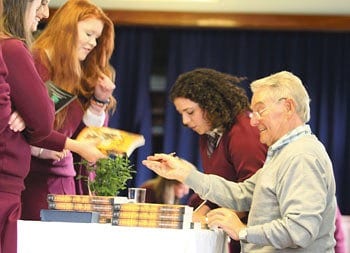 THE healthy, confident young women at Laurel Hill Colaiste, couldn’t possibly imagine what it’s like to be a nine- year- old boy, frozen, starving and living in constant fear of dying or being cruelly punished.
THE healthy, confident young women at Laurel Hill Colaiste, couldn’t possibly imagine what it’s like to be a nine- year- old boy, frozen, starving and living in constant fear of dying or being cruelly punished.
But Holocaust survivor, Tomi Reichental, painted a picture for them which none of the fourth and fifth year history students who formed his audience could ignore.
The Slovakian man, who has made his home in Dublin, unveiled some of the horror which he says “must not be forgotten”.
This week was the second time Tomi was invited to the school to speak to the students and provide them with a living history lesson.
They heard first hand the horrors which were perpetrated in the camp at Bergen-Belsen, where Tomi, his brother, mother and grandmother, were sent when he was just nine years- old.
Constantly cold and near starvation, Tomi described how Typhoid took 1,500 lives a month in the camp.
“After a while, the crematorium couldn’t cope, They started just throwing the bodies out in the open in the camp. After a time the stacks of bodies were four feet high, all over the camp The smell was appalling. Yet it is incredible when I think now, that as children we played in and around those decomposing corpses, we hid behind them in games of hide and seek”.
After Auschwitz was evacuated in the wake of the German retreat, the population of the camp doubled with 40,000 people arriving three in three months.
“People had to sleep four or five to a bed, with some getting a few hours sleep then having to get up to let others use the bed,” he explained.
Asked by one of the students whether he had ever had counselling for his ordeal, Tomi explained that for 50 years he had never spoken of it to anyone.
“My wife, who died nine years ago, didn’t know anything that happened to me in the camp. She only knew that I was a Holocaust survivor. My children only heard the stories after I started lecturing and doing interviews”.
At the end of the talk, Tomi signed copies of his book ‘I Was a Boy in Belsen’ for students and he was presented with a brass plaque by the staff and pupils.
He said that he decided to speak out as a voluntary lecturer because “ it is important that young people heard the story. Already we have people trying to deny that it ever happened – saying the Holocaust story is a Jewish plot. In 10 or 15 years there will be none of us left to tell the story”.
And advised the young people to “speak out if you see someone abusing a person because of his religion or nationality and tell them it is wrong. It is important to remember that we have a multicultural society in Ireland. I am not saying it could happen here, but the Holocaust began with whispers”.
After the talk, Vanessa Murray (17), from Mungret, who was one of the history students hearing the story told the Limerick Post: “it was really an eye-opening experience. There’s a message in what he said which needs to be carried on”.






